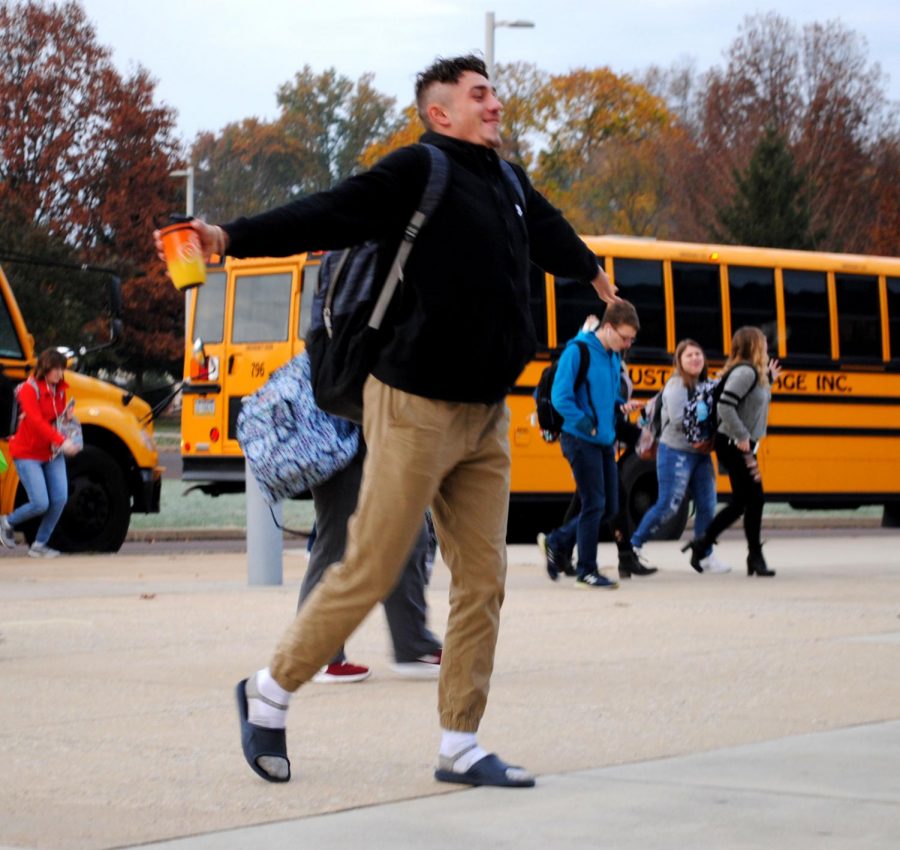High school should start later in day
Spring-Ford student Max Raisner stretches as he walks into the building with classmates at 7:10 a.m. on Monday, Nov. 12.
December 4, 2018
According to Nationwide Children’s Hospital, teenagers should be getting nine hours of sleep. While asking peers about this number, however, it is apparent that most do not even come close to accomplishing this goal.
The average high school student receives between five-to-six hours of sleep per night. This deficiency is causing serious problems with students in the community.
What are students so busy doing rather than sleeping?
Homework is a huge component of every student’s day. Out of 28 people surveyed, the average amount of time spent doing homework (written work, projects, and studying) was about three hours a night.
Also, many students partake in afterschool activities. While this is a fun and social part of school, it is also a responsibility to be there for their teammates.
Therefore, there does not seem to be enough hours in a day to do homework, sports, dance, work, music or whatever a student desires. Often many students stay up late to finish their duties and be able to have some relaxing time.
Staying up late is not only what students often resort to, but is biologically sound.
A Washington Post article stated, “The biological drives of teenagers to stay awake late aren’t caused by poor parenting, bright screens or undisciplined kids; teens around the globe were night owls before electronic media came along. This shift in sleep clocks is caused by puberty. The hormone that makes us feel sleepy, melatonin, peaks later in the teen brain, making it hard for a typical teen to fall asleep before 11 p.m. and to wake up before 8 a.m.”
To sum up, it is nearly impossible for high school students to be going to bed early, even if they are not busy, due to biology.
So why does it make sense for them to be the ones going to school the earliest?
The side effects of the lack of sleep?
You may be thinking, “its normal for students to be tired or busy. What’s the big deal?”
The scary thing is that this lack of sleep can cause serious medical problems.
Medical News Today reported that the effects of sleep deprivation hurt the immune system, making the sleep deprived more vulnerable to sickness, and puts them at a higher risk of getting respiratory disease, diabetes, cardiovascular disease, in addition to slowing down hormone production.
That is not to mention that students who lack sleep cannot focus, are forgetful, are depressed, and become irritable more often than not due to their lack of rest.
Furthermore, many students at Spring-Ford High School drive to school.
While it is not out of the norm to have teenagers not want to ride the bus when they have a license, sleep-deprived drivers can create a dangerous situation.
Pennsylvania’s driver’s test shares that teenagers driving with less than 8 hours of sleep is just as dangerous as driving under the influence.
Changing the school start time may help prevent a horrible car crash.
What can we do?
Everybody wants what is best for their children. So, the school should not have such an early start time.
While it is a process to get the busses to come home later, the school could arrange an alternate schedule with the elementary school.
Elementary school students do not possess the hormone that causes them to yearn to stay awake until later.Therefore, it is practical for them to go to bed earlier and get up earlier.
The truth is that later high school start times have been proven to be successful at many schools around our country.
The conversation states, “The teens’ use of drugs, cigarettes, and alcohol decline, their academic performance improves significantly with later start time.”
Furthermore, Minnesota’s Edina School district changed their schedule time and found that it had benefited their student’s mood and that crash rates in teens dropped by 70 percent.
It simply is practical to have school begin later for teenagers. Not only will it help
student’s academic scores but it will also help their health.
Let’s be smart, Spring-Ford. Keep students safe from crashes, avoid risk of serious health defects, and allow them to follow their body’s natural inclination to stay up late with a later start.

